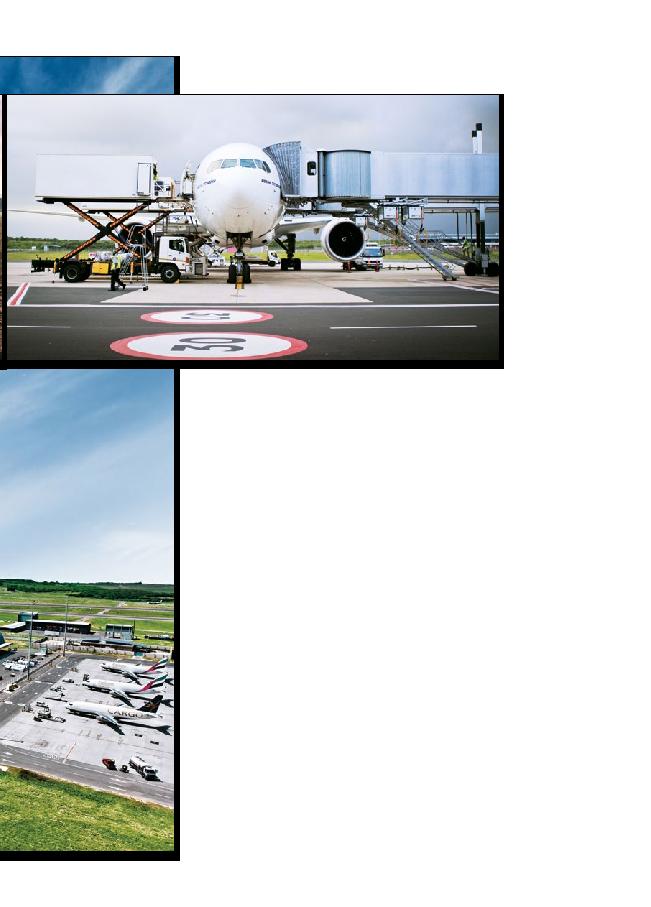
2013 SEPTEMBER Vol. 5 / No. 9 /
GA
17
an un-fragmented state within a
single operations complex...
The first international
contract to export produce
from Durban was recently
secured between Dube Trade
Port and a Dutch organisation
dealing in imported flowers.
Tulips to Amsterdam,
thirty thousand stems of Thai
Tulips (Curuma Alis Matifolia)
are now being produced each
week and exported to The
Netherlands from Durban.
The contract worth approx
R12m (E900 000) per year is the
first contract in Africa for growing
tulips and exporting these flowers
to Europe and even the U.S.A.
During the northern hemisphere
winter season, flower growers in
Europe look towards countries
in the southern hemisphere with
favourable climates to continue
with supplies of freshly cut flowers.
This demand has until recently
been satisfied mainly by flowers
produced in East African countries
and exported almost daily by
airfreight from Kenya into Europe.
The development of the
massive Glasshouse complex
at the Dube AgriZone is
a sophisticated design of
computerised climatic control
buildings designed by Dutch
engineers from The Netherlands.
With the expertise gained from
growing agricultural produce which
includes cucumbers, tomatoes
and peppers in environmentally
controlled conditions, the
opportunity presented itself
to nurture the growing in the
AgriZone Greenhouses, the
most celebrated flower of the
Netherlands, the Thai Tulips.
Originally thirty mother plants
were supplied from Amsterdam
for propagation in Dube AgriLab.
Using high tech Dutch propagation
methods to produce fifty thousand
mother plants, 30 000 flower
cropped stems are each week
freighted by air from Durban
via Dubai to The Netherlands.
The process of packaging
and transporting cut flowers is
delicate and extremely intricate.
Temperature throughout the
transportation process is maintained
constantly between 15C and 18C.
Twice weekly 15000 stems are
transferred from pack houses at
the AgriZone on a short ten minute
journey in refrigerated vehicles
to the Dube cargo terminal.
The boxed tulips are
received at the cargo terminal
where the flowers pass through
the mandatory airport security
screening mechanism before
being loaded onto an automated
Unit Loading Device (ULD).
During the short transfer from
the cargo terminal to the aircraft,
the consignment of containers
are wrapped in foil-like thermal
blankets to maintain the critical
temperature before the consignment
is loaded into the temp controlled
hold of an Emirates B777
passenger airliner bound for Dubai.
After arrival at the Emirates
cargo hub in Dubai, the infamously
hot humid weather fortunately
has some respite during the
region's winter season. Special
"cool dollies" however await the
aircraft to whisk the flowers onto
to a European bound freighter.
Dube Trade Ports Head
of Cargo Movements, Pelko
Atanassov who has been at
the forefront of developing
the operation of movement of
airfreight in Durban says the
organisation has systematically
been developing the potential to
encourage regular international
freight operations at Durban.
Having a capacity to handle one
hundred thousand tonnes of freight
per year, he says the organisation is
looking to develop regular freight
movement of foods and perishable
goods from Durban into some of
the land locked SADC regions.
By year end Pelko Atanassov
says, there are plans for 2 dedicated
freight aircraft to operate regularly
each week between Durban and
the SADC regions. Furthermore
a second operator is expected
to commence a regular freight
service between continental
Europe and Durban's King Shaka
International within a year.
Most scheduled aviation
links between South Africa and
Europe has routed through O.R.
Tambo International Airport
in Johannesburg with regular
dedicated freight airlines relying
on the Johannesburg hub for the
handling of international airfreight.
With Emirates Airline
having established a daily link
between Durban and Dubai the
opportunity to increase the pattern
of perishable cargo destined for
international markets has created
opportunities for the expansion
of trade out of the eastern coastal
region of South Africa. ·
Tulips to
Amsterdam
Thirty Thousand
stems of Thai
Tulips (Curuma Alis
Matifolia) are now
being produced
each week and
exported to The
Netherlands
from Durban

